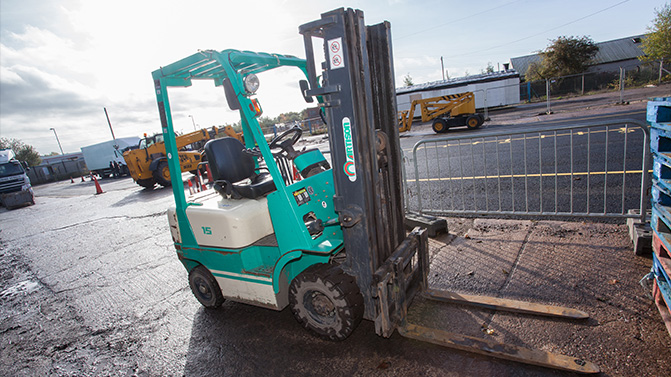Rules for Driving Forklifts on the Road
When it comes to forklifts, there is often confusion over whether they need to be registered, insured and taxed. Many businesses wrongly believe that if they don’t drive their machinery on roads, or they only do so minimally, they don’t have to subscribe to these three requirements. This can lead to companies unwittingly committing offences.
In this article, we’ll be helping you understand the legalities behind driving forklifts on the road.

Driving forklifts on roads under 1000 yards
The misconceptions over forklift regulations and road usage potentially stems from the fact they are exempt from Construction and Use Regulations when they are only used on public roads for under 1000 yards. They still, however, need to be registered and licensed but they will fall under a particular category for ‘works trucks’. To meet the ‘work trucks’ criteria, the forklifts should mainly be used on private premises, only using public roads for:
- Carrying goods between private premises (distances under 1000 yards)
- Passing between work sites/private premises (distances under 1000 yards)
- Working in connection to road works
Driving forklifts on roads over 1000 yards
If your forklift is to be used on public roads for more than 1000 yards, then it no longer receives the exemptions of being a ‘work truck’. This will mean that standard licensing and registration will be necessary.
The licensing of your forklift will be dependent on its gross weight, including any load being carried. If this weight exceeds 3,500kg, your forklift will be in the HGV class; if the weight is under 3,500kg, the machinery will be classified as a light goods vehicle.
For registering your forklift, usual rules for vehicles used on public roads and their registration and taxation requirements apply. This will require you to register your vehicle with your local DVLA office and fill out a V55/5 form. To fill in the V55/5 for a new forklift you are likely to need several pieces of documentation, such as:
- Evidence of the vehicle’s age/Certificate of Newness
- Certificate of insurance
- Valid test certificate
- Type approval
- Notification of Vehicle Arrivals (for imported vehicles)
- Copy of your driving license
If you are buying a second hand forklift for use on roads, you should ensure that the seller notifies the DVLA of the change of ownership. This will ensure that the forklift’s registration and the V55/5 document gets transferred into your name.
To drive your forklift on the roads, you will also need a number plate which complies with all legal requirements to be attached at all times.
Euro 1 Training are experts in plant machinery who offer a wide range of high quality training courses. The courses we provide – including for forklifts, excavators, tipper trucks and HGVs – are all taught by qualified teachers with hands-on industry experience. We offer certification upon completion of our courses which will leave you with the skills to become a talented and proficient operator. Get in touch with any enquiries – we serve customers throughout Sheffield, Wakefield and Goole.
